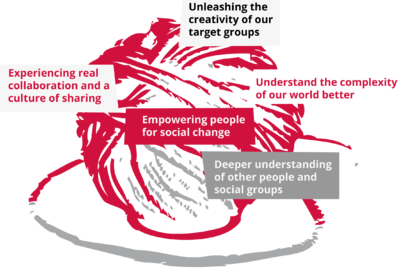Difference between revisions of "Understanding"
| Line 13: | Line 13: | ||
</div> | </div> | ||
| − | |||
| − | |||
| − | |||
| − | |||
| − | |||
| − | |||
| − | |||
| − | |||
| − | |||
<div style="width:100%;border:1px dashed #ccc; padding:5px; float:left; margin:10px"> | <div style="width:100%;border:1px dashed #ccc; padding:5px; float:left; margin:10px"> | ||
Revision as of 18:44, 13 January 2016
Contents
Power
Introduction:Empowerment as an educational paradigm equips individuals with skills for feeling, using and sharing power.
Competencies
Introduction:For applying complex knowledge it is not enough simply to teach it. For facilitation we might conclude, that the learning processes have to be open enough to cover the broad range of skills, knowledge and experience, that one needs for his or her work or activity.
Experiential Learning
Introduction:Experiential learning is holistic learning that combines everyday life, school, and all activities beyond formal education in the civil society.
It starts with yourself
Introduction:Before our participants or students may imagine the bigger picture behind their activties, for what they may use their knowledge, capacities, skills, we as facilitator need to reflect on our vision, our skills. Empowering learning processes require motivating, appreciating and professional facilitators.
What's inside this section?
Methods
Statements
I love empowerment, I feel good when the people empower me! :)

